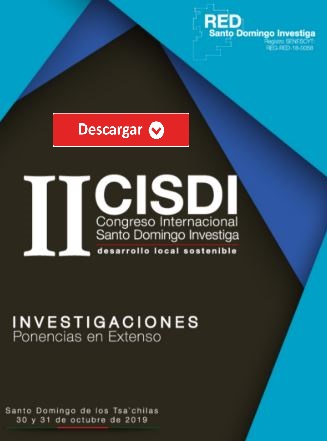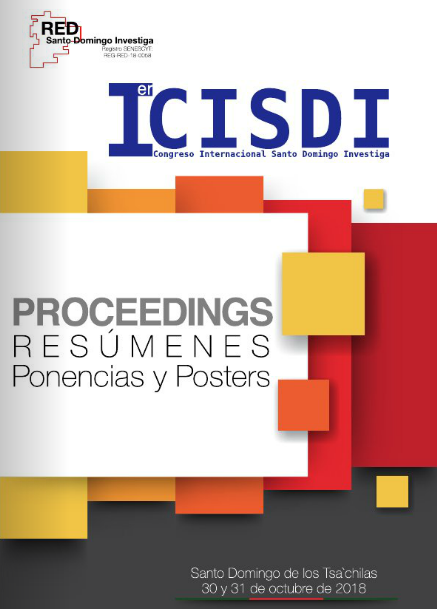TEMA: LIMITACIÓN DE LA EFICACIA DE LA ACCIÓN DE PROTECCIÓN GARANTIZADA EN LA CONSTITUCIÓN DEL 2008.
LIMITATION OF THE EFFECTIVENESS OF THE PROTECTION ACTION GUARANTEED IN THE 2008 CONSTITUTION
Saltos Salgado, Marco Fernando; Eras Díaz, Jorge Alfredo; Valverde Torres, Yanhet Lucía; Andrade Salazar, Oswaldo Liber.
- Esta dirección de correo electrónico está protegida contra spambots. Necesita activar JavaScript para visualizarla. Docente, Universidad Uniandes, Santo Domingo, Ecuador II.Esta dirección de correo electrónico está protegida contra spambots. Necesita activar JavaScript para visualizarla. Docente, Universidad Uniandes, Santo Domingo, Ecuador III.Esta dirección de correo electrónico está protegida contra spambots. Necesita activar JavaScript para visualizarla. Docente, Uniandes, Santo Domingo, Ecuador
IV.Esta dirección de correo electrónico está protegida contra spambots. Necesita activar JavaScript para visualizarla. Docente Uniandes, Santo Domingo, Ecuador
RESUMEN
El objeto de esta investigación es evidenciar la inconstitucionalidad del numeral 3 del Artículo 40 de la Ley Orgánica de Garantías Jurisdiccionales y Control Constitucional, porque se contrapone a la norma constitucional del artículo 88 de la Constitución respecto de la acción de protección cuyo propósito es la protección directa y eficaz de los derechos reconocidos en la Constitución y al tener el carácter de norma suprema prevalece sobre cualquier otra del ordenamiento jurídico, conforme establece el Artículo 424 de la Carta Magna, consecuentemente, ninguna norma puede limitar la garantía de los derechos porque estos sirven para proteger a los ciudadanos cuando son vulnerados, así lo establece la Constitución del 2008 que instauró en el Ecuador una nueva concepción del estado denominado Constitucional de Derechos, basado en el Neoconstitucionalismo que es una tendencia vigente en el mundo desde hace varias décadas y desde el 2008 en el Ecuador. Esta teoría plantea que las constituciones, normas positivas o leyes, deben delimitar los poderes estatales y proteger los derechos fundamentales, por tanto, el estado está sometido estrictamente a las leyes con énfasis en el respeto a los derechos y garantías de las personas y está obligado a garantizar el efectivo goce de los mismos a través de las garantías jurisdiccionales. Esta investigación es de carácter descriptivo, bibliográfico, porque estuvo dirigida a determinar cómo es y cómo está la situación del problema planteado, a la vez es de aplicación práctica porque se ofrece una propuesta factible para la solución. El bibliográfico se utilizó para fundamentar teóricamente el presente trabajo investigativo revisando y analizando obras, libros, doctrinas, diccionarios jurídicos, gacetas judiciales y la normativa constitucional y legal vigente. Por tanto, se concluye que la norma legal antes citada, distorsiona la esencia del artículo 88 de la Constitución, limitando su eficacia, razón por la cual, debería ser analizada por la Corte Constitucional para que declare su inconstitucionalidad.
Palabras clave:
Inconstitucionalidad; garantía; acción de protección; tutela eficaz; garantismo
ABSTRAC
The purpose of this investigation is to demonstrate the unconstitutionality of the numeral 3 of Article 40 of the Organic Law on Jurisdictional Guarantees and Constitutional Control, because it is contrary to the constitutional rule of article 88 of the Constitution with respect to the protection action whose purpose is the direct and effective protection of the rights recognized in the Constitution and having the character of the supreme rule prevails over any other legal system, as provided for in Article 424 of the Magna Carta, consequently, no rule can limit the guarantee of rights because they serve to protect citizens when they are violated, as established by the 2008 Constitution that established in Ecuador a new conception of the state called Constitutional Rights, based on the Neoconstitutionalism that has been a trend in place in the world for several decades and since 2008 in Ecuador. This theory suggests that constitutions, positive norms or laws must delimit state powers and protect fundamental rights, therefore, the state is strictly subject to laws with an emphasis on respect for the rights and guarantees of persons and is obliged to ensure their effective enjoy through judicial guarantees. This research is descriptive, bibliographic in nature, because it was aimed at determining how the situation of the problem raised is and is doing, it is both practical because a feasible proposal for the solution is offered. The literature was used to theoretically substantiate the present investigative work by reviewing and analyzing works, books, doctrines, legal dictionaries, judicial gazettes and current constitutional and legal regulations. It is therefore concluded that the abovementioned legal rule distorts the essence of Article 88 of the Constitution, limiting its effectiveness, which is why it should be analyzed by the Constitutional Court in order to declare its unconstitutionality.
Keywords:
Unconstitutionality; warranty; protection action; effective guardianship; garantism


















